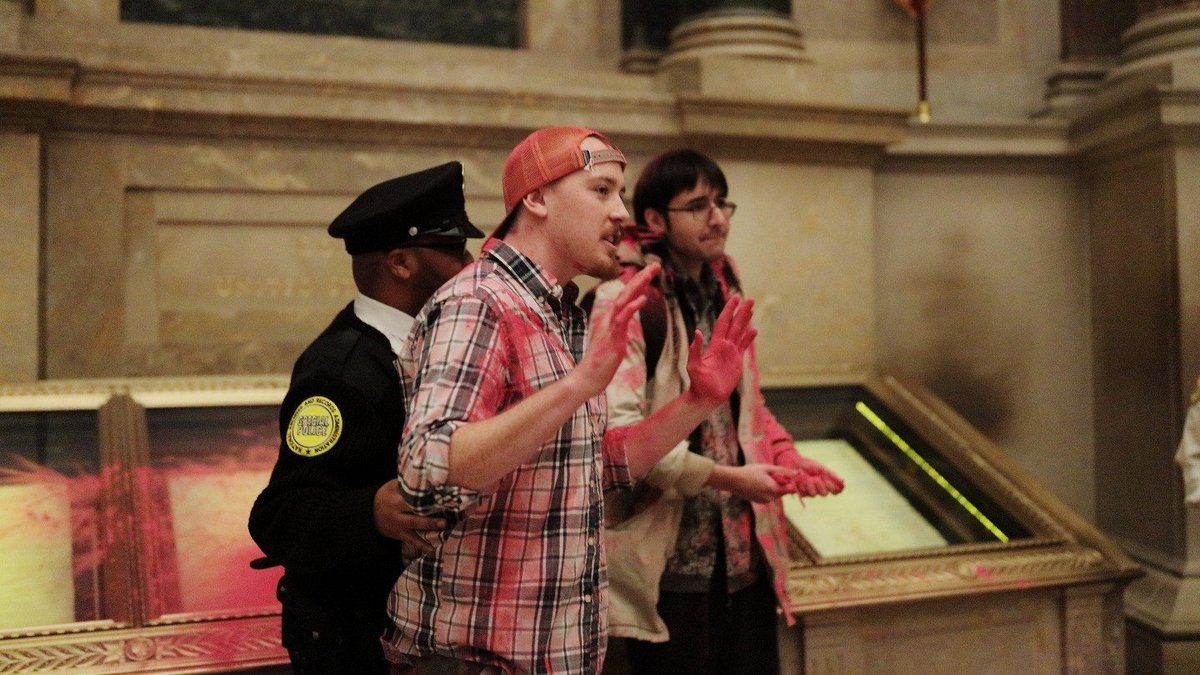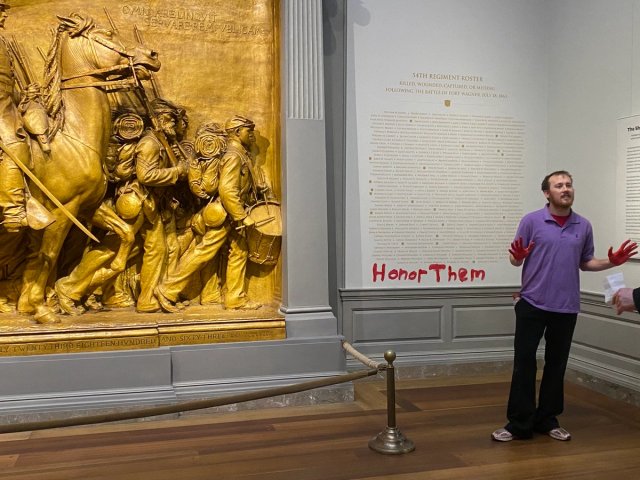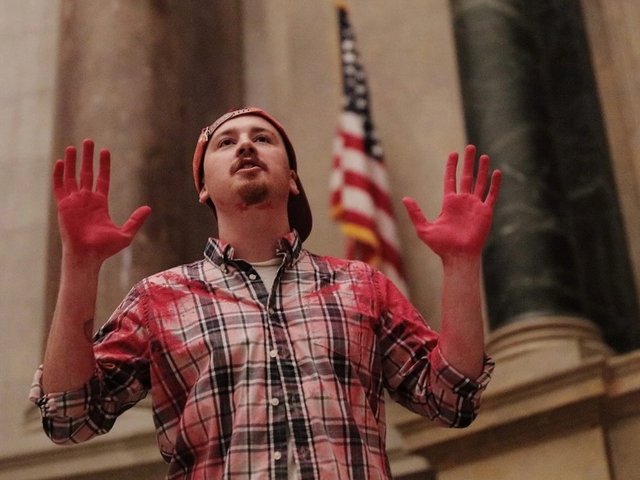The two climate activists who on 14 February poured red powder on a museum display case holding the US Constitution have each been sentenced to more than a year in prison. Donald Zepeda of Maryland was handed a two-year sentence; his co-defendant, Jackson Green of Utah, got 18 months. Each will also have two years of supervised release.
Zepeda and Green are involved with the climate-activism group Declare Emergency, and they have both previously participated in similar actions at museums. The difference in their sentences is likely due to Zepeda’s longer history of actions in the name of climate activism—including filming the paint-smudging of the case holding Edgar Degas’s famed Little Dancer in April 2023.
For Green’s part, he was the one who wrote “Honor Them” on the wall in red paint next to an African American Civil War memorial last year at the National Gallery of Art (NGA) in Washington, DC. Zepeda filmed that protest as well, although Green was the only one arrested, charged and ultimately sentenced to 90 days in prison, which he will serve concurrently with his new 18-month sentence. Green was also ordered to pay $706 in restitution to the NGA.
In a statement, US District Judge Amy Berman Jackson, who presided over the Constitution case, called Zepeda and Green’s actions at the National Archives in Washington, DC, “unserious, ineffective and unconnected to the climate emergency in any way”. She added that the sentences were necessary in order to deter future similar actions in what she called a “misguided” act of protest. “The message has to be clear: eco-vandalism is not a good idea,” she said. “It’s not ecological. It's just vandalism.”
Coincidentally, Jackson was also assigned to the Degas case, which involved two other Declare Emergency activists (with help from Zepeda). One of them, Joanna Smith, pleaded guilty and was handed a 60-day prison sentence with two years of supervised release and 150 hours of community service in April of this year. The other, Timothy Martin, is scheduled for a jury trial starting on 6 January 2025—again with Jackson presiding.
Zepeda and Green had each pleaded guilty to one charge of destruction of government property, which carries a maximum sentence of ten years in prison. As part of their sentences, they are expected to pay the National Archives $58,607.59 for the damage caused to the display case. The Constitution itself was unharmed, but the incident led the archives to close to the public for four days and to beef up security.
In a statement read in court, Green wrote: “I did genuinely think we were going about the actions in such a way that they wouldn’t cause significant harm to others, but I realise now the ignorance and lack of consideration that belief represented. I also recognise that regardless of my intentions, the harm I caused is real and is my responsibility.” He added: “I have come to realise that in addition to causing direct harm to individuals, destructive protest actions like the ones I carried out can lead to the opposite of our intentions by creating a negative response—turning people off from climate activism and creating further discord.”
Zepeda’s court statement was less apologetic, defending his actions and blaming the government for its friendliness with the fossil-fuel industry and lack of response to the climate crisis. He cited a 2023 Senate report, which estimated that “taxpayers pay about $20bn every year to the fossil-fuel industry” in the form of federal subsidies. Zepeda added that the feelings stirred up by his actions were very much a part of the point: “We need to feel that real sense of fear and emotion, lest we relegate this issue to future generations who are less able to address the problem.”
Zepeda is often cited as a co-founder and leader of Declare Emergency. In the past several years, he has participated in a number of climate actions and, according to a recent profile by New York Magazine’s Elizabeth Weil, he has been arrested more than 20 times for civil disobedience. Perhaps most notably, back in 2017—years before the dawn of Declare Emergency—Zepeda broke into an oil-pipeline facility in Washington State in an attempt to shut down a pipeline carrying tar-sands oil in from Canada. Zepeda failed to reach the safety valve but was convicted of second-degree burglary, sabotage and malicious mischief and spent 60 days in prison. He was happy to learn later that the facility had, in fact, shut down the pipeline on their own accord for several hours as a result of his actions.






